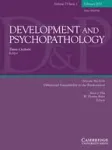[article]
| Titre : |
A longitudinal study of self-efficacy and depressive symptoms in youth of a North American Plains tribe |
| Type de document : |
texte imprimÃĐ |
| Auteurs : |
Walter D. SCOTT, Auteur ; Eric DEARING, Auteur |
| AnnÃĐe de publication : |
2012 |
| Article en page(s) : |
p.607-622 |
| Langues : |
Anglais (eng) |
| Index. dÃĐcimale : |
PER Périodiques |
| RÃĐsumÃĐ : |
We used a 3-year cross-sequential longitudinal design to examine the relations between self-efficacy judgments in three different domains (academic, social, resisting negative peer influences), cultural identity, theories of intelligence, and depressive symptoms. One hundred ninety-eight American Indian youths participated in the study, who all attended a middle school on a reservation in the northern plains of the United States. We conducted multilevel models to examine both between- and within-person associations as well as to investigate lagged within-youth associations. We found that not only did youths with relatively high self-efficacy have lower depressive symptom levels than other youths, but also increases in efficacy beliefs for academic, social, and for resisting negative peer influences predicted decreases in depressive symptoms within youths, even after controlling for previous levels of depressive symptoms as well as both contemporaneous and previous academic achievement. Neither cultural identity nor theories of intelligence moderated the relationship between self-efficacy and depression. As the first evidence that within-youth improvements in self-efficacy has developmental benefits, our findings help fill a long empty niche in the line of studies investigating the impact of efficacy beliefs on depressive symptoms. |
| En ligne : |
http://dx.doi.org/10.1017/S0954579412000193 |
| Permalink : |
https://www.cra-rhone-alpes.org/cid/opac_css/index.php?lvl=notice_display&id=155 |
in Development and Psychopathology > 24-2 (May 2012) . - p.607-622
[article] A longitudinal study of self-efficacy and depressive symptoms in youth of a North American Plains tribe [texte imprimÃĐ] / Walter D. SCOTT, Auteur ; Eric DEARING, Auteur . - 2012 . - p.607-622. Langues : Anglais ( eng) in Development and Psychopathology > 24-2 (May 2012) . - p.607-622
| Index. dÃĐcimale : |
PER Périodiques |
| RÃĐsumÃĐ : |
We used a 3-year cross-sequential longitudinal design to examine the relations between self-efficacy judgments in three different domains (academic, social, resisting negative peer influences), cultural identity, theories of intelligence, and depressive symptoms. One hundred ninety-eight American Indian youths participated in the study, who all attended a middle school on a reservation in the northern plains of the United States. We conducted multilevel models to examine both between- and within-person associations as well as to investigate lagged within-youth associations. We found that not only did youths with relatively high self-efficacy have lower depressive symptom levels than other youths, but also increases in efficacy beliefs for academic, social, and for resisting negative peer influences predicted decreases in depressive symptoms within youths, even after controlling for previous levels of depressive symptoms as well as both contemporaneous and previous academic achievement. Neither cultural identity nor theories of intelligence moderated the relationship between self-efficacy and depression. As the first evidence that within-youth improvements in self-efficacy has developmental benefits, our findings help fill a long empty niche in the line of studies investigating the impact of efficacy beliefs on depressive symptoms. |
| En ligne : |
http://dx.doi.org/10.1017/S0954579412000193 |
| Permalink : |
https://www.cra-rhone-alpes.org/cid/opac_css/index.php?lvl=notice_display&id=155 |
|  |


